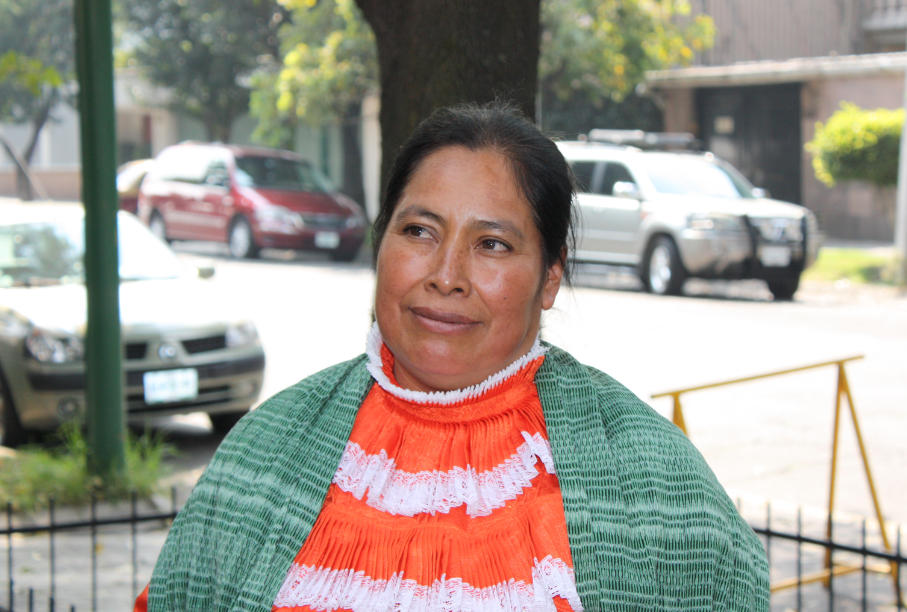
Jacinta Francisco Marcial
Jacinta Francisco Marcial, Alberta Alcántara Juan, and Teresa González Cornelio are Otomí-speaking ñhäñhú women street vendors who have struggled for the past decade to force the Mexican government to do more than `stop oppressing’ indigenous women. Asserting their dignity as indigenous women, they have demanded justice. This week they may have moved a step closer to that goal.
Jacinta Francisco Marcial, Alberta Alcántara Juan, and Teresa González Cornelio were arrested, charged, tried, convicted, and sentenced to decades in prison for a crime that never occurred. On March 26, 2006, members of the now-defunct Federal Investigation Agency (AFI) of the federal Attorney General’s Office showed up at the town plaza of Santiago Mexquititlán in the state of Querétaro. Never identifying themselves as police, they began to shake down the local street vendors, the vast majority of whom were ñhäñhú women. The women massed around the agents and demanded they stop their extortion. The agents’ superiors arrived and offered to pay for damages, and that should have been that.
Four months later, Jacinta Francisco Marcial, Alberta Alcántara Juan, and Teresa González Cornelio were arrested and charged with having kidnapped six agents. The evidence was allegedly a newspaper photograph that showed the three women somewhere in the vicinity of the crowd of indigenous women. The trial dragged on for two years. Not a single federal agent ever showed up or gave testimony, and yet all three women were sentenced to 21 years in prison. That’s justice in Querétaro for the crime of being a working poor, indigenous woman.
At the time of her imprisonment, Jacinta Francisco Marcial was 43 years old. She was married and the mother of six children. She sold juices and ice cream in the town square. Jacinta Francisco Marcial was guilty of the crime of survival with a modicum of dignity.
When she was sent to jail, the Centro Prodh took up her case. Soon after, Amnesty began investigating and campaigning as well. In September 2009, Jacinta Francisco Marcial was released from prison. The Attorney General’s Office had dropped the charges, but never declared her innocent. In April 2010, Alberta Alcántara Juan and Teresa González Cornelio were also released. At the time of their release Alberta Alcántara Juan was 31, and Teresa González Cornelio 25 years old. Teresa González Cornelio gave birth to a baby girl while in prison.
The three women had been released, but Jacinta Francisco Marcial had not been exonerated, and so she sued the State for damages and demanded an apology. In May 2014, in a groundbreaking case, Jacinta Francisco Marcial won, the first time a Mexican citizen sued the State for wrongful incarceration and was awarded reparations and a public apology.
The State refused to pay up or apologize. This week, the earlier judgment was confirmed, and there’s no chance for the State to appeal the decision. The State must compensate and formally apologize, and it must do so by September 2016.
Mexico currently holds over 9000 indigenous people in its prisons. The prisons are hellholes generally, and for indigenous people, even more so. There are little to no language services either in the courts or in the prisons, and so many indigenous people are left to fend for themselves, which is to say disappear. As Jacinta Francisco Marcial has explained on more than one occasion, she didn’t know what kidnapping was when she was charged with that crime.
According to the Mexican National Commission on Human Rights, the conditions of women’s prisons are deplorable. Querétaro’s Centro de Reinserción Social Femenil San José El Alto offers threats, humiliation, discrimination; toxic maintenance conditions; unregulated and irregular application of solitary confinement; overcrowding; and more. According to the Commission, Querétaro’s Centro de Reinserción Social Femenil San José El Alto is not one of the worst women’s prisons in Mexico, not by a long shot.
The State tried to crush Jacinta Francisco Marcial, Alberta Alcántara Juan, and Teresa González Cornelio, because it considered three working poor indigenous women as so much dust. From the streets to the courts to the prisons to the highest offices in the land, State agents thought they could abuse such women with impunity. But when they struck Jacinta Francisco Marcial, Alberta Alcántara Juan, and Teresa González Cornelio, they hit and dislodged a boulder that will continue to roll and pound until the State of impunity is crushed. There are many Jacintas in Mexico and beyond.
(Photo Credit: Centro Prodh) (Video Credit: Amnesty / YouTube)